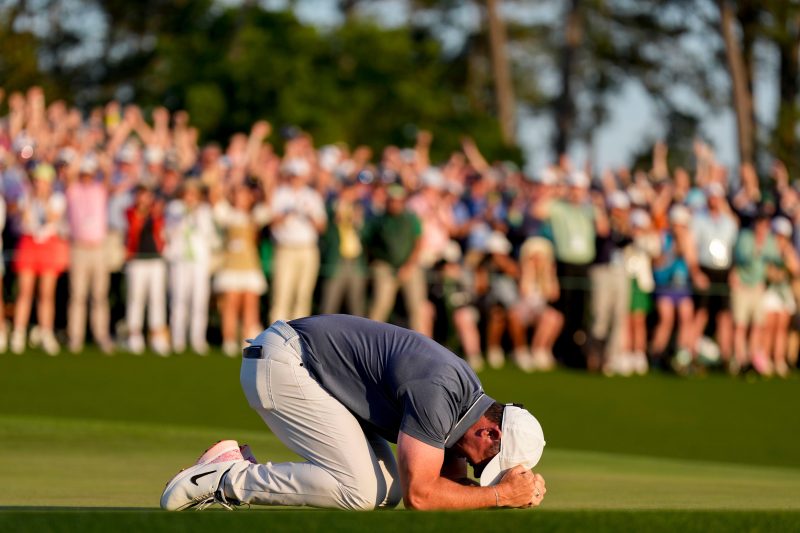AUGUSTA, Ga. – At some point generations from now, after all of us are long gone, they will look back at the records and the numbers and the championships under Rory McIlroy’s name and think that all of it was inevitable, that one of the great players in the history of golf simply did what he was always destined to do.
But sports don’t work that way. Life doesn’t work that way.
So let it be said here and for posterity that the story of how McIlroy won the 89th Masters on Sunday, becoming the sixth player to complete the career Grand Slam, was an 11-year journey of doubts and disappointments, of resilience and reckoning, of vexation before validation.
Anyone who says this was preordained for one of the most talented golfers to ever pick up a club wasn’t there as Masters after Masters passed, as the carefree kid grew into his mid-30s, as each gutting loss fed the cycle of cynicism and time started to seem a little more precious as it tends to do for an athlete who wanted something so badly.
“I’ve carried that burden since 2014,” McIlroy said, referring to the year he won the Open Championship to get three-fourths of the way there. “Thankfully now I don’t have to carry it.”
Goodness, even the idea that this was all going to end Sunday at dusk with McIlroy on the 18th green at Augusta National, flipping the putter over the back of his head, dropping to his knees and elbows on the green in an uncontrollable heaving sob, mouth agape screaming to the sky seemed unlikely, then certain, then unlikely, then certain again to who-the-hell-knows within the span of five stomach-churning hours.
When McIlroy double-bogeyed the first hole, briefly coughing up the lead to Bryson DeChambeau as they walked to the third tee, a sense of dread crept into the massive galleries that the worst might be happening again. And then at the very moment it seemed like McIlroy had the tournament sewn up, the worst did happen at No. 13 when he made one of the most inexplicable double-bogeys in nearly a century of golf here, sparking a sequence of holes and shots so improbable that we can safely call this the most dramatic Masters ever played.
“Just a complete roller coaster of emotions,” McIlroy said.
And perhaps more than that, the notion that there was always going to be a Masters out there for McIlroy to finish the Grand Slam sells short something about him far more interesting than his gift to hit a golf ball. Of anyone who has ever achieved immortal things in sport, McIlroy is inescapably human. He feels, he emotes, he shares, he thinks, perhaps to his detriment. And he has taken all the fans of this game on a journey that shows us, perhaps more than any other athlete of his caliber, just how vulnerable, fragile and, yes, how mentally tough, he can be.
“You’ve had Jack (Nicklaus), Gary (Player), Tom (Watson), Tiger (Woods), you name it come through here and all say I’ll win the Masters one day,” he said. “That’s a hard load to carry. These are idols of mine and it’s very flattering that they all come up here and believe in me and my abilities to win this tournament and achieve the Grand Slam and all that. But it doesn’t help.”
We cannot rob McIlroy of what that journey has been like because seeing every dimension of his genius and his fallibility careening across Augusta National on Sunday until he finally delivered the wedge and the putt that beat Justin Rose in an improbable playoff is what his appeal is really all about.
For all the millions of dollars, the four major championships he won as a young man, the adoration across the globe, McIlroy made it such that you never knew if this day would come until he knew. And you only needed to take one look at him walking off the 18th green, the tension on his face replaced by relief, to understand that he didn’t know either.
This could only happen one way. We had to get the full Rory: Frustrating, daring, exhilarating, exhausting and ultimately spellbinding.
“We were sort of part of history today,” Rose said. “Someone won the career Grand Slam. It’s a momentous day in the game of golf and quite rightly fans are going to be excited about that. He’s captivating to watch, he’s a great player, he plays with so much style and charisma ‒ and you never quite know as well because he’s made a few mistakes under pressure and (fans) want to keep watching, keep guessing.”
Thankfully, they don’t need to guess anymore.
Because as many times as McIlroy has left a major in the past decade wondering what-if over one bad driver swing, one nervous putt, one horrendous decision when it’s all on the line, it’s hard to know how the scar tissue truly affects a man when he finds himself back in that position.
In the past, McIlroy has put up various defense mechanisms to justify to himself what was happening to his career and his reputation in major championships. He either didn’t care or he cared too much, and it was always a zig or a zag toward whatever seemed convenient.
This year, McIlroy’s mantra was that he had to be willing to get his heart broken to finally break through and achieve the thing he wanted most. But as the final round played out Sunday, the idea that he could have his heart broken this time and keep coming back for more seemed a Hogan Bridge too far.
“I certainly didn’t make it easy,” he said. “I was nervous. It was one of the toughest days I’ve ever had on a golf course.”
After his terrible start, he regained his footing and the lead on No. 3, the short par-4, when he rolled in a birdie and DeChambeau three-putted for bogey. Then, after walking off No. 10 with a birdie – the hole where McIlroy lost it all with a triple-bogey in 2011 – nobody was within five shots. The tournament seemed over.
But it was never going to be that simple.
Everything about McIlroy’s lay up from the middle of the fairway on No. 13, the par-5, before hitting an inexplicably poor chip into the creek was stunning and perhaps indicative of why he had never won this tournament before. It was a disaster reminiscent of what happened Thursday, when McIlroy chipped from behind the lightning-quick No. 15 green into the water, ruining a round that was headed toward greatness.
“I truly believe I’m a better player now than I was 10 years ago,” he said. “Just it’s so hard to stay patient, so hard to keep coming back every year and trying your best and not being able to get it done. And there were points on the back 9 today I thought, ‘Have I let this slip again?’ ‘
It was not only McIlroy’s fourth double-bogey of the week, it changed the tournament. Rose, surging across the final holes, was suddenly tied and then briefly took the lead. Ludvig Aberg gave himself a chance down the stretch. But the Masters was still going to come down to one thing: Would McIlroy rise to meet history, or would the occasion swallow him?
In the end, it was a little of both. A brilliant 7-iron drawn over the pond on No. 15 giving him a 5-foot, 7-inch look at eagle that ultimately became a two-putt birdie. A makeable putt that grazed the edge and didn’t drop at No. 16. A cluch birdie on No. 17 that gave him a one-shot lead again. Lining up a 4-footer to win on No. 18, only to miss it meekly off the left edge. Then coming back minutes later for a playoff on the very same hole and funneling a wedge back off the shelf to within a couple feet and finally a green jacket.
“It was all relief,” he said. “I’ve been coming here 17 years and it was a good decade plus of emotion that came out.”
And with that, the most draining chapter of a fascinating career closed under the Georgia dusk and we didn’t have to guess what it meant. McIlroy spent years telling us and an all-time Masters Sunday showing us. History will make it look more predictable than it was, because the details usually get lost to time.
McIlroy wrote the best ending possible to his Grand Slam story, but until the final putt dropped, none of us – even him – could be sure that it would ever happen.
Follow Dan Wolken on social media @danwolken.bsky.social

